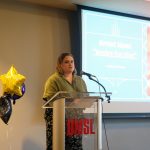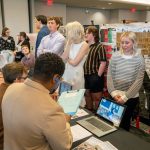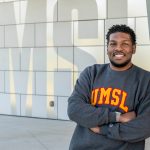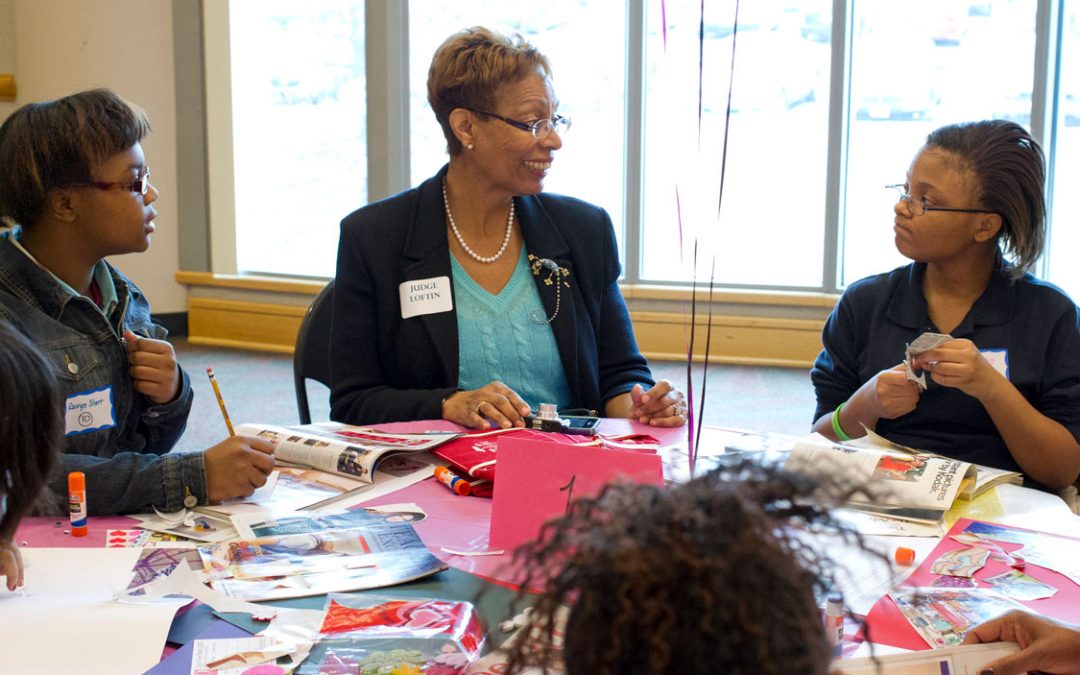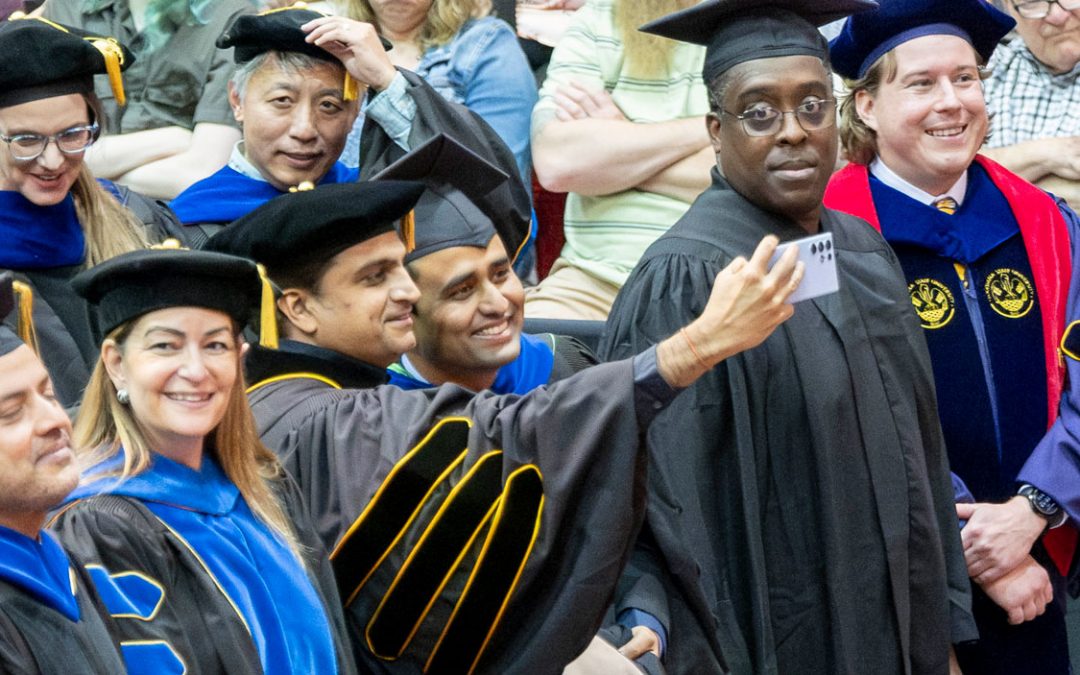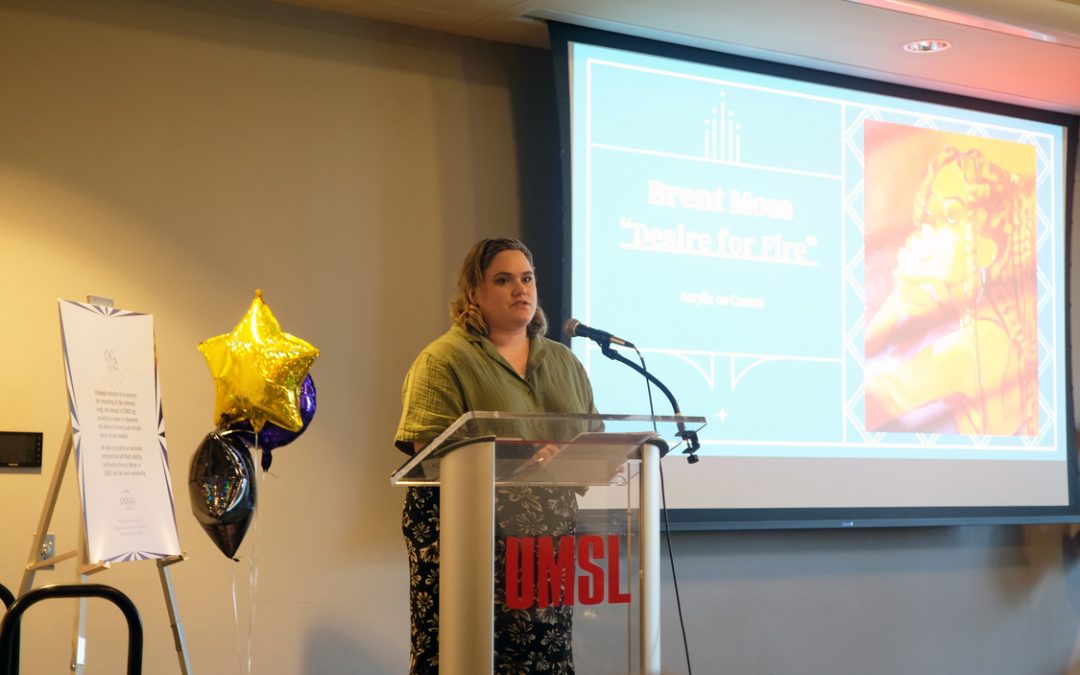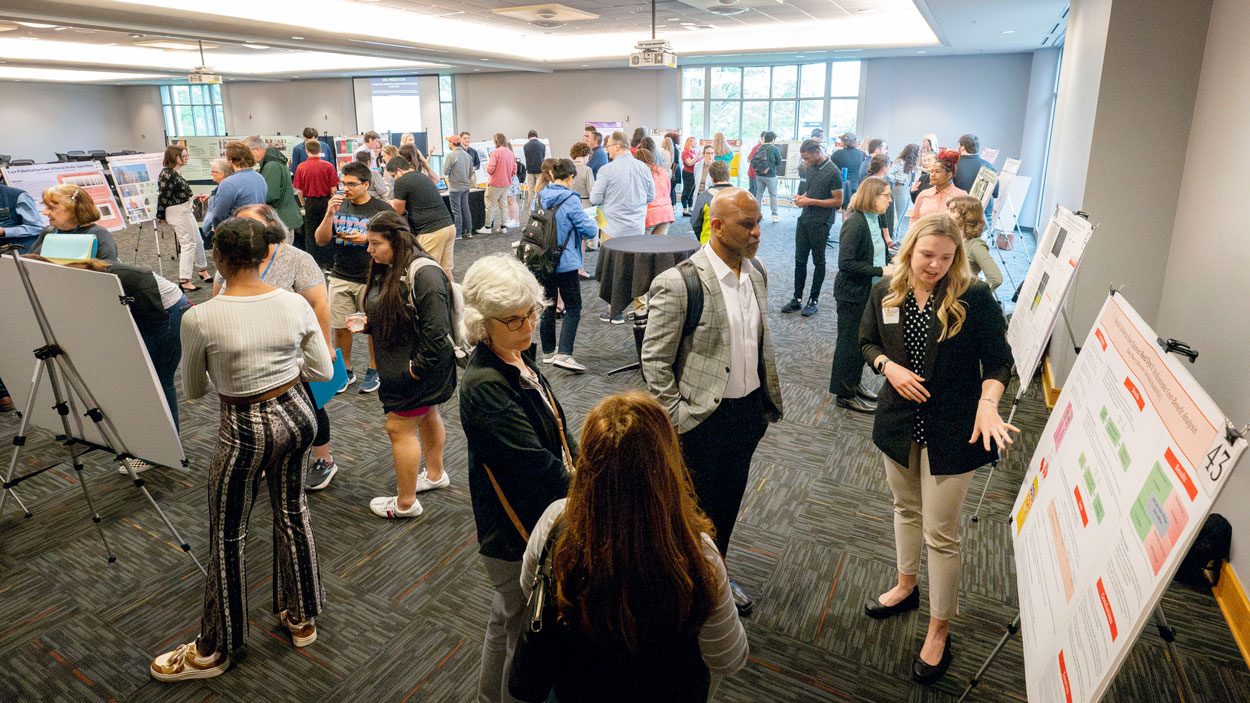
Junior economics major Kaley Ware (at right) discusses her research on the economic cost-benefit analysis of California’s ban on Red Dye No. 3 with Jerome E. Morris, the E. Desmond Lee Endowed Professor of Urban Education. Ware and about 70 other students participated in the Undergraduate Research Symposium Friday afternoon in the Millennium Student Center. (Photos by Derik Holtmann)
True crime media has exploded in recent years. According to the Pew Research Center, about one third of podcast listeners regularly consume the genre, and shows with titles such as “Crime Junkie” and “My Favorite Murder” top the charts.
But how does that kind of media diet impact listeners’ mental health?
University of Missouri–St. Louis senior Armani LaCour endeavored to answer that question with her research project, “Effects of the True Crime Genre on Anxiety.” LaCour, a psychology major, explained that the results aren’t what one might assume.
“Violent media is well established in the literature to induce chronic and acute anxiety, so because of this, it was hypothesized that true crime would indeed increase anxiety,” she said. “However, this was actually inconsistent with the studies that I found. A 2023 study actually suggests that true crime may increase confidence in the audience. So, they have a better understanding for how to avoid situations where violence can occur. Another study conducted in 2021 actually indicates that women who are naturally more anxious or fearful are more motivated to seek out true crime in an effort to understand how to defend themselves.”
LaCour was one of the participants in Friday’s Undergraduate Research Symposium at the Millennium Student Center. The URS is a professional-style venue for undergraduates to present their original, mentored investigations and creative inquiries to family members, faculty, students and staff. Nearly 60 projects were presented by more than 70 students who were mentored by more than 30 faculty members.
The afternoon began with a student lunch in the Century Rooms and continued with oral presentations in three MSC rooms and visual presentations on the third-floor rotunda and in the Century Rooms. The event concluded with a social hour and reception.
The student projects ran the gamut, including topics such as ADHD diagnoses, community engagement, competition among wasp species, food security, media literacy and substance use disorders.
Attendees were able to sit in on oral presentations and also circulate around the Century Rooms and rotunda, where students enthusiastically explained their projects and answered questions.
LaCour was inspired to investigate the effects of true crime media because she is a consumer of it herself. Before beginning her research, she assumed it would increase anxiety but was pleasantly surprised to find that it did not. Many of the people she spoke with at the event carried similar assumptions before listening to her presentation.
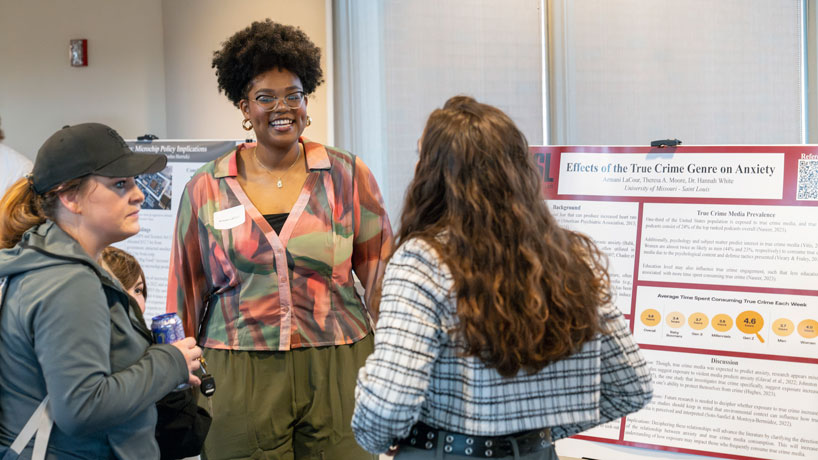
Senior Armani LaCour explains her research project, “Effects of the True Crime Genre on Anxiety.” Her poster presentation was a popular stop amongst attendees.
“Once I explained the results of the two studies, I found people shocked about it,” she said. “I feel like it causes more awareness amongst the people who stopped by for the presentation. This kind of makes people more aware of how the media they consume, not even necessarily true crime but just in general, can affect their mood.”
She was happy to share her work with the UMSL community and plans to continue her studies and research in graduate school.
“It’s definitely been fulfilling to be able to share my findings with other people and also just educate people a little bit more on this topic,” LaCour said.
Freshman Gro Kelrick focused his research on American and Chinese industrial policies related to the production and sophistication of microchips. Kelrick looked at the geopolitical ramifications of policies in both countries. He noted that the U.S. has an overreliance on Taiwan for microchip production, and with recent tensions between China and Taiwan, it has invested in domestic fabrication facilities and specialized education.
“China sees the U.S. increasing their microchip production as a threat,” Kelrick said. “So they bumped up their production with a series of policies.”
Kelrick is majoring in data science and analysis, but he has an interest in foreign policy and came across the issue in a political science course. The implications of these policies captivated him, and he feels that it’s important that more Americans are educated on the matter.
“Access to these types of things is paramount for both military and commercial sectors,” he said. “If the U.S. lost access to that, if China were to invade Taiwan, for example, or if prices were too high for supply to be able to reach the level of demand, or if people were unable to get their hands on microchips, that would be a vast problem. This research is to basically sound the alarm bells on that.”
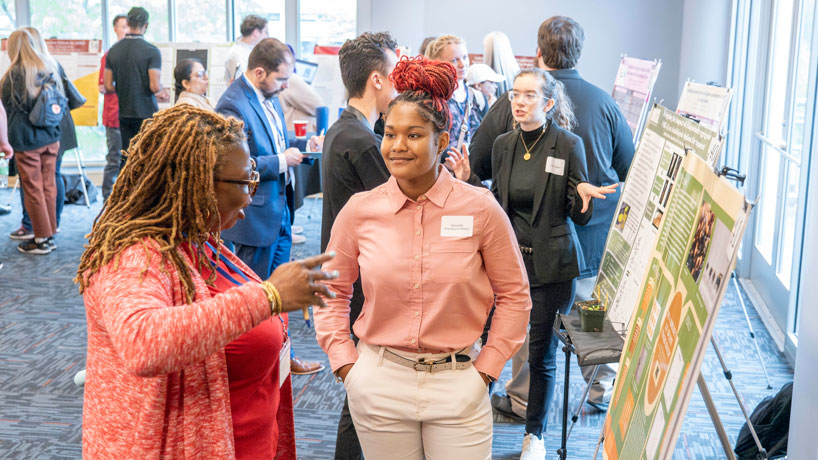
Junior Alametta Thompson-Hinton fields a question about her research from Colette Dixon, the associate provost of student success.
Senior Theresa Colombini studied a different intersection of politics and technology with her project, “User Polarization from AI Social Media Algorithms.” Colombini, an international relations major with a minor in marketing, delved into how artificial intelligence-driven recommendation systems influence the selection and exposure to politically charged content across various digital platforms.
Using survey data from users on platforms including Facebook and Reddit, Colombini found that people who lean the most left or right politically use Facebook the most. However, on platforms like Reddit, which have more content personalization options, regular users appeared to be more politically moderate.
“It’s been really eye-opening for me to be able to see how you can educate yourself better using social media,” she said.
Visitors to her poster presentation were eager to engage with the topic.
“People have just honestly been curious, because they’re asking questions like, ‘Can I trust the media?’ ‘Can I trust what I’m seeing?’” she said. “It’s interesting to help address those concerns that people don’t talk about as much in the casual world and to be able to hear people’s different perspectives all across the board. No matter what your political leaning is, you should want to know more about this.”
Junior Alametta Thompson-Hinton developed a study on bumblebees that examined how size influences foraging behavior. Thompson-Hinton, a biochemistry major, realized there was a gap in research analyzing the impact of size differences, which compelled her to pursue the subject. The findings of the project supported her hypothesis that larger bees tend to collect more nectar. She said that can positively affect the health of a colony, which has broader repercussions for local ecosystems.
“If they’re able to get more nectar, then they’re able to produce more larvae and bees to effectively pollinate,” Thompson-Hinton explained.
Overall, the students were proud to take part in the event and exhibit their work for the UMSL community.
“It’s been fairly fun actually,” Thompson-Hinton said. “It’s been a good opportunity to put yourself out there and talk to people about what you’ve been doing. It’s actually meaningful to be able to present it to the crowd. I think it’s been a good experience.”





